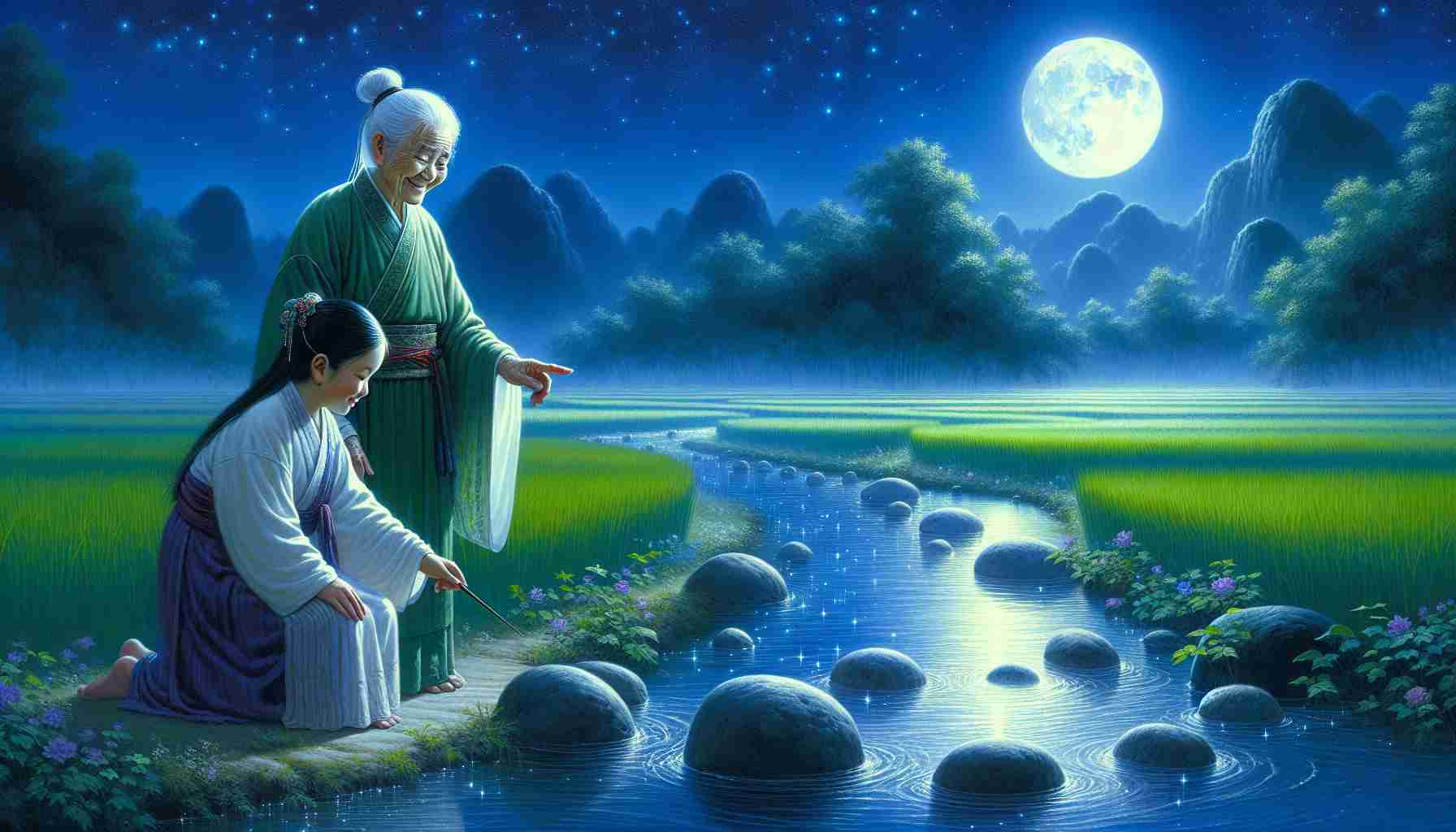

The wind whistled softly across the rice fields as I carried my empty basket home. My name is Lian, and I lived in a quiet village cradled between two hills. That day had been long and full of work, but I couldn't stop thinking about what my teacher, Master Yun, had told us earlier.
He was old—his hair as white as mountain snow—and he spoke like the wind: soft but strong. He often told stories from the Tao Te Ching, a very ancient book written by Laozi, a wise man from long ago. Laozi believed that people should live simply and follow the natural way of things, something called the Tao. That morning, Master Yun had told us, “The softest thing in the world can overcome the hardest. This is the way of the Tao.”
I didn’t understand it. How could soft things beat hard ones? Stones are hard; water is soft. Yet no rock ever drinks up a river.
So later that night, I asked Grandmother. She was sitting on the porch, peeling apples with a knife that looked older than the hills.
“Grandmother,” I said, “what does it mean when Master Yun says the soft can beat the hard?”
She smiled, and her eyes sparkled like the stars above.
“Come,” she said, standing up. “Let’s go to the stream.”
The moon was high and bright as Grandmother and I walked to the little stream that ran behind our house. It gurgled and babbled over the rocks, soft and gentle.
“Watch the water,” she said.
We stood in silence.
It flowed quietly around everything. Over time, I saw how it had shaped the stones—round and smooth like river pearls.
“Water never fights,” Grandmother said. “It doesn’t push. It finds the path of least trouble. Yet it wears down the hardest stone. That is Wu Wei—non-action. It means not forcing things. Just flowing.”
I watched the water again, seeing how it moved around fallen leaves and rocks without stopping. It didn't rush. It didn't worry. It just kept going.
The next day at school, I told Master Yun what I saw.
He nodded and said, “Just like the Tao. We do not need to control life. We need to move with it, gently and simply. When you push too hard, you fall. But when you flow, you fly.”
That lesson stayed in my heart.
Since then, I’ve stopped trying to force answers or chase what isn’t ready. When I feel angry, I breathe and think of the water. When I feel lost, I sit quietly, waiting for the path to show itself.
And though I’m still learning, I now understand what Master Yun meant.
I didn’t change overnight. But now, whenever I’m confused or upset, I remember the stream and the way it flowed without worry. And I try my best to move like the river—quiet, steady, and full of peace.
The wind whistled softly across the rice fields as I carried my empty basket home. My name is Lian, and I lived in a quiet village cradled between two hills. That day had been long and full of work, but I couldn't stop thinking about what my teacher, Master Yun, had told us earlier.
He was old—his hair as white as mountain snow—and he spoke like the wind: soft but strong. He often told stories from the Tao Te Ching, a very ancient book written by Laozi, a wise man from long ago. Laozi believed that people should live simply and follow the natural way of things, something called the Tao. That morning, Master Yun had told us, “The softest thing in the world can overcome the hardest. This is the way of the Tao.”
I didn’t understand it. How could soft things beat hard ones? Stones are hard; water is soft. Yet no rock ever drinks up a river.
So later that night, I asked Grandmother. She was sitting on the porch, peeling apples with a knife that looked older than the hills.
“Grandmother,” I said, “what does it mean when Master Yun says the soft can beat the hard?”
She smiled, and her eyes sparkled like the stars above.
“Come,” she said, standing up. “Let’s go to the stream.”
The moon was high and bright as Grandmother and I walked to the little stream that ran behind our house. It gurgled and babbled over the rocks, soft and gentle.
“Watch the water,” she said.
We stood in silence.
It flowed quietly around everything. Over time, I saw how it had shaped the stones—round and smooth like river pearls.
“Water never fights,” Grandmother said. “It doesn’t push. It finds the path of least trouble. Yet it wears down the hardest stone. That is Wu Wei—non-action. It means not forcing things. Just flowing.”
I watched the water again, seeing how it moved around fallen leaves and rocks without stopping. It didn't rush. It didn't worry. It just kept going.
The next day at school, I told Master Yun what I saw.
He nodded and said, “Just like the Tao. We do not need to control life. We need to move with it, gently and simply. When you push too hard, you fall. But when you flow, you fly.”
That lesson stayed in my heart.
Since then, I’ve stopped trying to force answers or chase what isn’t ready. When I feel angry, I breathe and think of the water. When I feel lost, I sit quietly, waiting for the path to show itself.
And though I’m still learning, I now understand what Master Yun meant.
I didn’t change overnight. But now, whenever I’m confused or upset, I remember the stream and the way it flowed without worry. And I try my best to move like the river—quiet, steady, and full of peace.